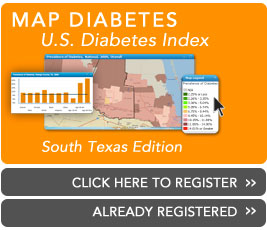Posted by Staff
Minority Diabetes Reports
Thursday, August 7th, 2014
Diabetes Care August 2014
OBJECTIVE The American Heart Association’s recommendations for optimal health, summarized in Life’s Simple 7, have been associated with reduced risk of cardiovascular disease (CVD)-related end points, but no studies have examined the association of these goals with incident type 2 diabetes, which is associated with high risk for CVD. The purpose of this analysis was to examine the associations of Life’s Simple 7 goals with incident diabetes among American Indians, a population at high risk of cardiometabolic diseases. Read more
Posted by Staff
Minority Diabetes Reports
Thursday, August 7th, 2014
The Diabetes EducatorJuly/August 2014
Purpose The purpose of this study is to investigate the racial/ethnic disparities in health-related quality of life (HRQOL) among adults with self-reported diabetes and identify the different risk factors related to HRQOL for specific racial/ethnic groups in the United States.
Methods National Health and Nutrition Examination Survey (NHANES) 2001-2010 participants (ages 20 years and older) who were self-identified as non-Hispanic white, non-Hispanic black, or Hispanic and with self-reported diabetes were included in the analysis (n = 2594). The Centers for Disease Control and Prevention’s HRQOL-4 was used to assess factors associated with HRQOL through multivariate logistic regression models with survey weighting. Stepwise model selection was applied to select the most significant factors for HRQOL in each racial/ethnic group. Read More
Posted by Staff
Minority Diabetes Reports
Thursday, August 7th, 2014
The Diabetes EducatorJuly/August 2014
Purpose The purpose is to provide an overview of a 20-year research program aimed at testing diabetes self-management education interventions culturally tailored for Mexican Americans residing in an impoverished rural community on the Texas-Mexico border.
Methods The research program involved focus group interviews to obtain community input, pilot testing to refine instruments and interventions, and community-based randomized controlled trials to examine intervention effects. Here the authors summarize lessons learned related to the (1) overall effects of culturally tailored diabetes self-management education; (2) impact of culture on study design, intervention development, health outcomes, and community acceptance; (3) benefits of and findings from multiple focus groups held over time in the community; and (4) personal and cultural motivators for behavioral change that were evident among study participants. Read More
Posted by Staff
Clinical Trials
Thursday, August 7th, 2014
Diabetes Care July 28, 2014
OBJECTIVE To comprehensively compare the effects of a very low carbohydrate, high unsaturated/low saturated fat diet (LC) to a high-unrefined carbohydrate, low fat diet (HC) on glycemic control and cardiovascular disease (CVD) risk factors in type 2 diabetes (T2DM).
RESEARCH DESIGN AND METHODS Obese adults (n = 115, BMI 34.4 ± 4.2 kg/m2, age 58 ± 7 years) with T2DM were randomized to a hypocaloric LC diet (14% carbohydrate [<50 g/day], 28% protein, and 58% fat [<10% saturated fat]) or an energy-matched HC diet (53% carbohydrate, 17% protein, and 30% fat [<10% saturated fat]) combined with structured exercise for 24 weeks. The outcomes measured were as follows: glycosylated hemoglobin (HbA1c), glycemic variability (GV; assessed by 48-h continuous glucose monitoring), antiglycemic medication changes (antiglycemic medication effects score [MES]), and blood lipids and pressure. Read More
Posted by Staff
Clinical Trials
Thursday, August 7th, 2014
Diabetes Care August 2014
OBJECTIVE To compare the efficacy and safety of weekly albiglutide with daily sitagliptin, daily glimepiride, and placebo.
Research Design And Methods Patients with type 2 diabetes receiving metformin were randomized to albiglutide (30 mg), sitagliptin (100 mg), glimepiride (2 mg), or placebo. Blinded dose titration for albiglutide (to 50 mg) and glimepiride (to 4 mg) was based on predefined hyperglycemia criteria. The primary end point was change in HbA1c from baseline at week 104. Secondary end points included fasting plasma glucose (FPG), weight, and time to hyperglycemic rescue. Read more
Posted by Staff
Clinical Trials
Thursday, August 7th, 2014
Diabetes Care August 2014
OBJECTIVE There is no consensus on the importance of visit-to-visit glycemic variability in diabetes. Therefore, we assessed the effects of visit-to-visit variability (VVV) in HbA1c and fasting glucose on major outcomes in the ADVANCE (Action in Diabetes and Vascular Disease: Preterax and Diamicron MR Controlled Evaluation) trial.
RESEARCH DESIGN AND METHODS ADVANCE was a factorial randomized controlled trial of intensive glucose control and blood pressure lowering in patients with type 2 diabetes. VVV in the intensive glucose treatment group was defined using the SD of five measurements of HbA1c and glucose taken 3–24 months after randomization. Outcomes were combined macro- and microvascular events and all-cause mortality occurring post 24 months. Sensitivity analyses were performed using other indices of variability and in the standard glucose treatment group. Read More
Posted by Staff
Clinical Trials
Thursday, August 7th, 2014
The Diabetes EducatorJuly/August 2014
Abstract
Ongoing interaction between diabetes educators and patients is necessary for making and sustaining behavior changes essential for glycemic control and subsequently reducing the complications of diabetes.
Purpose The purpose of this study was to determine the feasibility of diabetes self-management support (DSMS) delivered via telephone or secure message and to compare clinical outcomes (A1C, LDL), behavioral goal achievement, and health maintenance task completion. Read More



























